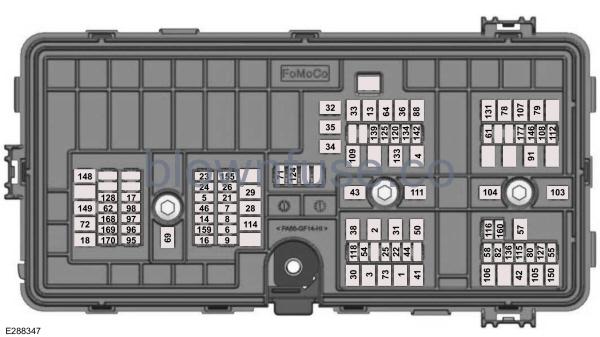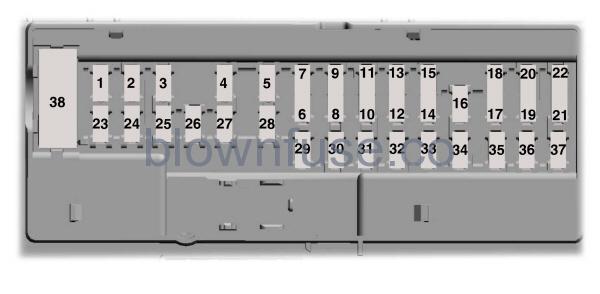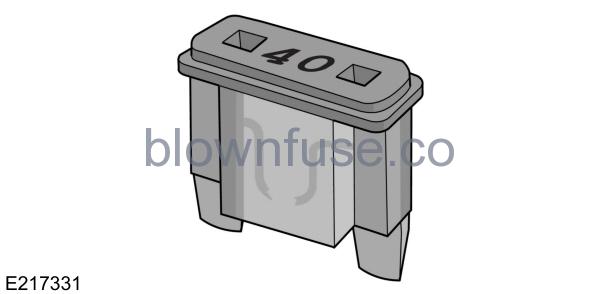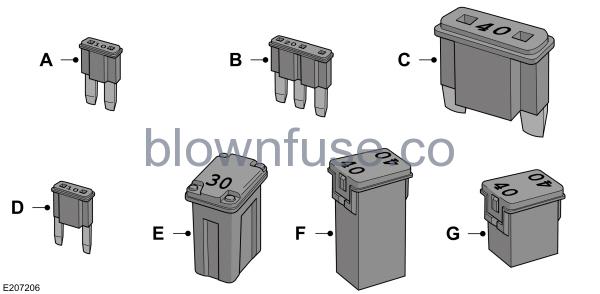FUSE SPECIFICATION CHART
Engine Compartment Fuse Box
 WARNING: Always disconnect the battery before servicing high current fuses. WARNING: Always disconnect the battery before servicing high current fuses. WARNING: To reduce risk of electrical shock, always replace the cover to the power distribution box before reconnecting the battery or refilling fluid reservoirs. WARNING: To reduce risk of electrical shock, always replace the cover to the power distribution box before reconnecting the battery or refilling fluid reservoirs. |
The engine compartment fuse box is under the driver side leaf screen in the engine compartment. It has high-current fuses that protect your vehicle’s main electrical systems from overloads.If you disconnect and reconnect the battery, you need to reset some features. See Changing the 12V Battery. Note: Replace fuses with the same type and rating. See Changing a Fuse.

| Fuse or Relay Number | Fuse Rating | Protected Component |
|---|---|---|
| 1 | 40A | Body control module – battery power in feed 1. |
| 2 | 20A | Power outlet main console bin. |
| 3 | 40A | Body control module – battery power in feed 2. |
| 4 | 30A | Fuel pump. |
| 5 | 5A | Powertrain control module keep alive power. |
| 6 | 20A | Powertrain control module power. |
| 7 | 20A | Canister vent solenoid. Evaporative leak control module. Exhaust gas heat recovery (hybrid electric vehicle). Tank pressure control valve (hybrid electric vehicle). Refueling valve (plug-in hybrid electric vehicle). Vapor blocking valve. Universal exhaust gas oxygen 11. Universal exhaust gas oxygen 21. Catalyst monitor sensor 12. Catalyst monitor sensor 22. Canister purge valve. |
| 8 | 20A | Cooling fan relay coil. Battery interrupt box. Transmission oil pump. Auxiliary coolant pump. Fuel flap door (hybrid electric vehicle). Engine coolant bypass valve. Active grille shutters. |
| 9 | 20A | Ignition coils. |
| 13 | 40A | Front blower motor relay. |
| 14 | 15A | Transmission oil pump. A/C compressor variable clutch. Auxiliary pumps (hybrid electric vehicle). |
| 16 | 15A | Windshield and rear window washer pump relay power. |
| 17 | 5A | Charge status indicator (hybrid electric vehicle). |
| 18 | 30A | Starter motor. |
| 21 | 10A | Headlamp leveling motors. Adaptive headlamps. |
| 22 | 10A | Electric power assisted steering module. |
| 23 | 10A | Anti-lock brake system module with integrated park brake. |
| 24 | 10A | Powertrain control module. Hybrid powertrain control module. |
| 25 | 10A | Air quality sensor. 360 camera with park aid. Rear view camera. Blind spot information system. Adaptive cruise control module. |
| 26 | 15A | Transmission control module. |
| 28 | 40A | Anti-lock brake system valves with integrated park brake. |
| 29 | 60A | Anti-lock brake system pump with integrated park brake. |
| 30 | 30A | Driver seat module. |
| 31 | 30A | Passenger seat motor. |
| 32 | 20A | Front media bin power point. |
| 33 | 20A | Rear cargo area power point. |
| 34 | 20A | Console end cap power point. |
| 35 | 20A | Power point 4. |
| 36 | 40A | Power inverter. |
| 38 | 30A | Climate controlled seat module. |
| 41 | 30A | Power liftgate module. |
| 42 | 30A | Trailer brake control module. |
| 43 | 60A | Body control module. |
| 44 | 10A | Brake on and off switch. |
| 46 | 15A | Battery charger control module (hybrid electric vehicle). |
| 50 | 40A | Heated backlite. |
| 54 | 20A | Heated steering wheel. |
| 55 | 20A | Trailer tow park lamps. |
| 57 | 30A | Trailer tow battery charge. |
| 58 | 10A | Trailer tow backup lamps. |
| 61 | 15A | Multi-contour seat module. |
| 62 | 15A | Headlamp washer pump. |
| 64 | 40A | Four-wheel drive module. |
| 69 | 30A | Front window wiper motor. |
| 71 | 15A | Rear window wiper motor. |
| 72 | 20A | Not used (spare). |
| 73 | 30A | Driver door module. |
| 78 | 50A | Left-hand heated windshield. |
| 79 | 50A | Right-hand heated windshield. |
| 80 | 20A | Trailer tow. |
| 82 | 20A | Not used (spare). |
| 88 | 20A | Rear blower motor. |
| 91 | 20A | Trailer tow lighting module. |
| 95 | 15A | Integrated spark control (hybrid electric vehicle). |
| 96 | 15A | Not used (spare). |
| 97 | 10A | Electric AC (hybrid electric vehicle). High voltage positive temperature coefficient heater (hybrid electric vehicle). |
| 98 | 10A | Traction battery coolant proportional valve (hybrid electric vehicle). |
| 103 | 50A | Not used (spare). |
| 104 | 50A | Not used (spare). |
| 105 | 40A | Not used (spare). |
| 106 | 40A | Not used (spare). |
| 107 | 40A | Not used (spare). |
| 108 | 20A | Not used (spare). |
| 109 | 30A | Passenger door module. |
| 111 | 30A | Body control module voltage quality monitor feed. |
| 112 | 20A | Not used (spare). |
| 114 | 50A | Not used (spare). |
| 115 | 20A | Amplifier. |
| 116 | 5A | Not used (spare). |
| 118 | 30A | Second row heated seats. |
| 120 | 15A | Port fuel injectors. |
| 124 | 5A | Rain sensor. |
| 125 | 5A | USB smart charger 1. |
| 127 | 20A | Amplifier. |
| 128 | 15A | Not used (spare). |
| 131 | 40A | Power folding seat module. |
| 133 | 15A | Heated wiper park. |
| 134 | 10A | Family entertainment system. |
| 136 | 20A | Not used (spare). |
| 139 | 5A | USB smart charger 2. |
| 142 | 5A | Traffic cam. |
| 146 | 15A | Battery electronic control module. |
| 148 | 30A | Left-hand headlamp module. |
| 149 | 30A | Right-hand headlamp module. |
| 150 | 40A | Not used (spare). |
| 155 | 25A | Transmission control module (hybrid electric vehicle). |
| 159 | 15A | DC/DC converter (hybrid electric vehicle). |
| 160 | 10A | Not used (spare). |
| 168 | 20A | Low voltage service disconnect. |
| 169 | 10A | Coolant pump (hybrid electric vehicle). |
| 170 | 10A | Traction battery coolant pump (hybrid electric vehicle). Pedestrian sounder (hybrid electric vehicle). |
| 177 | 10A | Not used (spare). |
Note: Spare fuse amperage may vary.
Passenger Compartment Fuse Panel
The fuse panel is under the instrument panel to the left of the steering column.Note: It may be easier to access the fuse panel if you remove the finish trim piece.

| Fuse or Relay Number | Fuse Rating | Protected Component |
|---|---|---|
| 1 | — | Not used. |
| 2 | 10A | Moonroof. ERA-GLONAS. eCall. Telematics control unit module. Inverter. Driver door switch pack. |
| 3 | 7.5A | Memory seat switch. Wireless accessory charger module. Seat switches. |
| 4 | 20A | Not used (spare). |
| 5 | — | Not used. |
| 6 | 10A | Not used. |
| 7 | 10A | Smart data link connector power. |
| 8 | 5A | Telematics control unit modem. Hands-free liftgate actuation module. Power liftgate module. |
| 9 | 5A | Keypad switch. Rear climate control. |
| 10 | — | Not used. |
| 11 | — | Not used. |
| 12 | 7.5A | Climate control head. Gear shift module. |
| 13 | 7.5A | Steering column control module. Smart datalink connector. Instrument cluster. |
| 14 | 15A | Not used (spare). |
| 15 | 15A | SYNC. Integrated control panel. |
| 16 | — | Not used. |
| 17 | 7.5A | Headlamp control module. |
| 18 | 7.5A | Not used (spare). |
| 19 | 5A | Headlamp switch. Push button ignition switch. |
| 20 | 5A | Ignition switch. Telematics control unit module. Key inhibit solenoid lock. |
| 21 | 5A | Not used. |
| 22 | 5A | Not used (spare). |
| 23 | 30A | Not used (spare). |
| 24 | 30A | Moonroof. |
| 25 | 20A | Not used (spare). |
| 26 | 30A | Not used (spare). |
| 27 | 30A | Not used (spare). |
| 28 | 30A | Not used (spare). |
| 29 | 15A | Not used (spare). |
| 30 | 5A | Trailer brake connector. |
| 31 | 10A | Terrain management switch. Selectable drive mode switch. Transceiver module. |
| 32 | 20A | Audio control module. |
| 33 | — | Not used. |
| 34 | 30A | Run/start relay. |
| 35 | 5A | Not used (spare). |
| 36 | 15A | Park assist module. Image processing module A. |
| 37 | 20A | Not used (spare). |
| 38 | 30A | Left-hand rear power window. Right-hand rear power window. |
Note: Spare fuse amperage may vary.
2020 Ford Explorer Owner’s Manual
CHANGING A FUSE
Fuses
 WARNING: Always replace a fuse with one that has the specified amperage rating. Using a fuse with a higher amperage rating can cause severe wire damage and could start a fire. WARNING: Always replace a fuse with one that has the specified amperage rating. Using a fuse with a higher amperage rating can cause severe wire damage and could start a fire. |

If electrical components in the vehicle are not working, a fuse may have blown. Blown fuses are identified by a broken wire within the fuse. Check the appropriate fuses before replacing any electrical components.Fuse Types

| Callout | Fuse Type |
|---|---|
| A | Micro 2 |
| B | Micro 3 |
| C | Maxi |
| D | Mini |
| E | M Case |
| F | J Case |
| G | J Case Low Profile |
